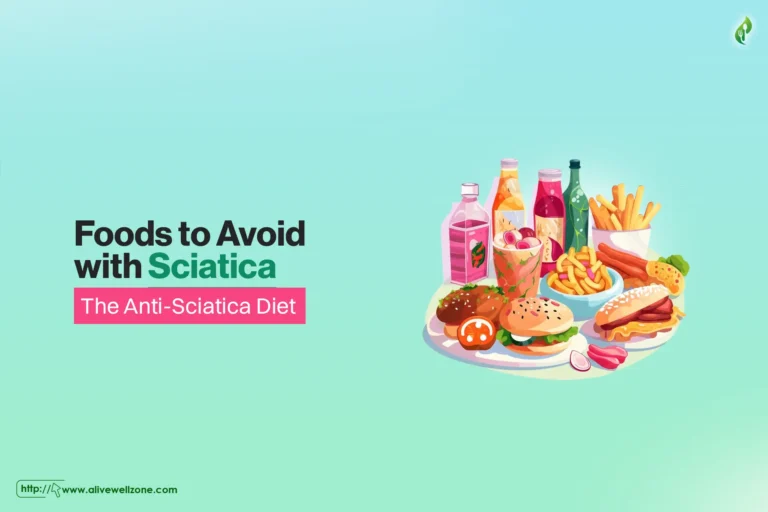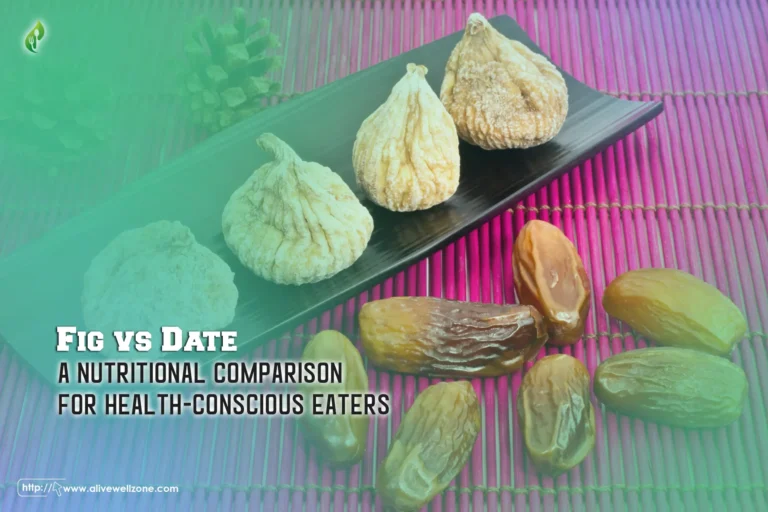
Last Updated on June 2, 2025 by Helena Akter
Why do some foods make you sick even if they look fine? It’s frustrating when you don’t know what’s causing your upset stomach. That’s why you should know which food that makes people sick will often help you avoid feeling bad.
High-risk foods include undercooked chicken, raw eggs, deli meats, and unpasteurized milk. They’re often contaminated with bacteria like Salmonella, E. coli, and Listeria. You need to cook properly, handle, and store them to prevent foodborne illnesses.
Moving forward, we’ll show you some interesting facts about food safety and how to stop it from happening. By the end, you’ll feel more confident about what to eat.
Key Takeaways
- High-Risk Foods: Foods like undercooked chicken, raw eggs, ground beef, and deli meats often carry harmful bacteria such as Salmonella, E. coli, and listeria. You must cook and handle these foods correctly.
- Important Facts: You can’t always tell if food is safe by its look or smell, and the five-second rule is a myth. Leftovers should be refrigerated within two hours, and washing raw poultry can spread bacteria.
- Common Causes: Foodborne illnesses are often caused by bacteria like Bacillus cereus, Norovirus, Salmonella, and Campylobacter. They can be found in contaminated food or water.
- Preventing Foodborne Illness: Cook food to the correct temperature, wash hands and surfaces thoroughly, and store food properly. These steps are vital to keep harmful germs out and ensure your food is safe.
What is a Foodborne Illness?
Foodborne illness also called food poisoning happens when you eat something bad. Your body tries to get rid of it, making you sick with throwing up, diarrhea, and fever. In fact, you can clearly see how unhealthy foods affect your body.
Germs like bacteria and viruses are usually the problem, but other things can make your food unsafe too. These include parasites, toxins, fungi, and chemicals.
Now, food gets contaminated if it’s Not —
- Cleaned well
- Fresh Cooked the right way
- Handled carefully
- Stored at the right temperature
- Cooled or frozen fast
Which Food That Makes People Sick Often?
As for foodborne illnesses, certain foods are more likely to make you sick. These high-risk items often carry harmful bacteria or germs that can lead to serious health issues if handled improperly.
Here’s a look at the common sources that you should be aware of.
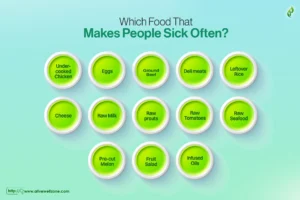
1. Undercooked Chicken
Chicken is tricky. Bad germs called Salmonella can hide inside it, Not just on the outside. These germs can make you really sick with fever, diarrhea, and cramps up to 3 days post-eating.
To kill these germs, cook your chicken all the way through to 165 degrees. Then, quickly put leftovers in the fridge. Always think of chicken as if it’s infected to stop germs from spreading.
That’s why washing your hands and everything that touches the raw chicken is super important. Aside from that, we’ve got a list of some good foods to try for you.
2. Eggs
To protect yourself from getting sick from eggs, the U.S. government has made new rules. They want to stop about 79,000 people from getting sick and save 30 lives each year.
You kNow eggs can carry harmful bacteria called Salmonella. This bacteria can get inside the egg or on the shell. To keep eggs safe, always put them in your fridge at 40°F or colder.
Plus, some recipes use raw eggs, which is risky. To be safer, you can buy pasteurized eggs. These are harder to find, so you can also make your own.
To do this, put eggs in 140°F water for at least 3 and ½ minutes. The eggs might get a little thicker, though!
3. Ground Beef
People first learned about E. coli in the 1990s. In fact, lots of kids and 700 grown-ups got very sick from eating poorly cooked hamburgers at a fast food place.
Sadly, four people died. E. coli is still a big problem today. This germ is found in both people and animals.
To keep safe, you should cook meat like steak and roast to 145°F. Plus, to kill germs, you must cook ground beef and pork at 160°F.
4. Deli meats
Deli meats are pre-cooked and sliced meats. They’re often used in sandwiches and light meals.
Now, Deli meats, like ham, turkey, or salami, can carry a nasty germ called listeria. This germ usually hides in places like food, your hands, and kitchen tools.
So, don’t just put deli meat in the fridge. To kill the germs, you must cook it until it’s steaming hot. It means hot dogs and sausages too. Hence, aim for a temperature of 165°F to be safe.
5. Leftover Rice
Leftover rice can make you sick. It has tiny germs called Bacillus cereus that live in rice fields. These germs can survive cooking and grow quickly in cold rice.
Eating a little bit of these germs might Not hurt, but if you eat a lot, you could feel sick. You might have diarrhea after about 15 hours, or you might feel sick and throw up within half an hour.
To stay safe, eat your rice right away while it’s hot. Don’t keep leftover rice in the fridge for more than one day.
6. Cheese
Soft cheeses like Brie and queso fresco can make you sick. They’re safer when you heat them to 165°F until they steam. Even if the milk used is safe, these cheeses can still carry germs.
They’re easy places for bad germs to grow because they are wet, salty, and Not very acidic.
Besides, hard cheeses like cheddar and Parmesan are usually safe to eat without heating. They also don’t have as much water and are saltier, which helps kill germs.
It’s also true for processed cheeses like string cheese, cottage cheese, feta, and mozzarella.
7. Raw Milk
Raw milk is milk that hasn’t been heated to kill germs. It’s one of the worst things you can eat because it can have lots of harmful germs like E. coli, listeria, campylobacter, and salmonella.
That’s why there are specific laws regulating it in each state. These germs can make you very sick, with —
- Bad diarrhea
- Vomiting
- Even serious problems like paralysis
Always check your milk, especially at farmers’ markets, to make sure it’s been heated to kill germs.
8. Raw Sprouts
Experts say those little alfalfa sprouts can be risky. The seeds themselves might have bacteria like E. coli, and the way they’re grown makes it even easier for more germs to show up.
Since you don’t cook sprouts, these germs can make you sick real fast.
So, if you must have sprouts, wash them extra carefully and cook them well. But most experts recommend skipping them altogether.
9. Raw Tomatoes
Raw fruits and veggies can get contaminated from animals, poop, and even bad water in the fields.
Now, tomatoes are especially at risk because they get dunked in big tanks of water after picking. In case the water is filthy, the tomatoes can soak up the bad stuff.
Not all tomatoes are troublemakers, though. To be safe, wash them really well and stick them in the fridge within a couple of hours of cutting them up.
And hope that restaurants do the same with theirs!
10. Raw Seafood
Several food safety experts say sushi poses a health risk since contaminated fish can carry bacteria. Oysters are even worse because they eat lots of water and can collect lots of these germs.
Some good news: things like lemon juice and vinegar (like in ceviche) and salty stuff like soy sauce can help slow down these germs.
But the safest way is to ensure your raw fish is really clean and fresh.
11. Pre-cut Melon
According to the CDC, Salmonella bacteria cause over 1.35 million infections, 420 deaths, and 26,500 hospital stays each year in the U.S.
And it’s especially in summer. Melons grow on the ground, so they can have dirt and germs on their skin. Pre-cut melon is even worse because it’s already open and can get more germs.
To stay safe, buy whole melons, wash them well, and keep cut-up melons cold.
12. Fruit Salad
Eating a whole apple is pretty safe, but fruit salad is different. When you mix lots of fruits together, you touch them more, and you might eat them over a few days.
So, it gives germs more time to grow. Plus, the fruits might come from different places, so there’s a bigger chance of germs getting in. That said, here are some of the most unhealthy foods you need to know.
13. Infused Oils
Making your own flavored oils, like garlic oil, might sound fun, but it can be really dangerous. These oils can grow a nasty germ called botulism that can make you very sick.
You shouldn’t can your food unless you’re sure you’re doing it correctly because this germ hides in sealed containers.
To be safer, keep your flavored oils in the fridge or add something like vinegar to them. It can help kill the bad germs. If you get botulism, it can be really bad and even make it hard to breathe.
To be extra careful, soak things like garlic or herbs in a citric acid solution for a whole day before you make the oil. It can help get rid of even more germs.
Surprising 6 Facts About Food Safety You Didn’t Know
You might be surprised to know that here are some facts about food safety most people don’t know. Whatever the danger or mistake, these six facts will help you keep your food safe and your family healthy.
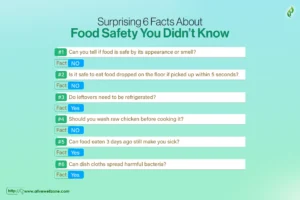
Fact 1: Can you tell if food is safe by its appearance or smell?
No. Most harmful microorganisms that cause illness don’t affect the look or smell of food.
Fact 2: Is it safe to eat food dropped on the floor if picked up within 5 seconds?
No. Microorganisms can transfer to food instantly and may cause illness.
Fact 3: Do leftovers need to be refrigerated?
Yes. Food becomes unsafe if left at room temperature for more than two hours.
Fact 4: Should you wash raw chicken before cooking it?
No, don’t do it! Washing chicken can spread germs to your hands, kitchen surfaces, and other foods. It can make you sick.
Fact 5: Can food eaten 3 days ago still make you sick?
Yes. Some harmful microorganisms take several days to cause symptoms.
Fact 6: Can dish cloths spread harmful bacteria?
Yes. Sponges and dish cloths can keep and spread harmful bacteria. Disinfect them with a disinfecting solution or by boiling them in water.
What are the Most Common Causes of Foodborne Illnesses?
Many different germs, 250 to be precise, can make you sick if you eat contaminated food. It’s hard to know exactly what’s causing the problem.
However, here are some common causes of foodborne illness —
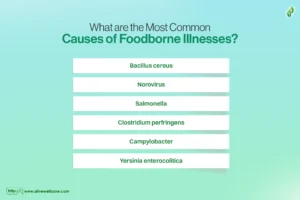
1. Bacillus cereus
One common germ is called Bacillus cereus. It can make you sick in two ways: you might vomit or you might have diarrhea. Between 2010 and 2020, this germ caused 7,900 people to get sick, nearly 2,800 were hospitalized, and 5 people died.
- Common Culprit: Foods like fried rice, cereal, cooked rice, pudding, vegetables, sauces, and meatloaf can carry this germ.
- Onset of symptoms: If you eat food with this germ, you might start feeling sick in less than an hour, or it could take up to 16 hours.
- Duration: You might feel nauseous and vomit, or you could have diarrhea.
2. Norovirus
Norovirus also known as stomach flu. It’s a very contagious bug that can cause stomach problems.
In fact, it’s the main reason people get sick from food in the U.S., with up to 21 million cases each year. Winter is the worst time for it!
- Common Sources: You can catch norovirus from eating bad leafy greens,shellfish, or fruits. Dirty water or food touched by a sick person can also spread it. You can also get it by touching something contaminated or being near someone who’s sick.
- Onset of symptoms: Symptoms usually start within 12 to 48 hours of being exposed.
- Duration: These problems usually go away after 12 to 60 hours.
3. Salmonella
Salmonella is an especially common germ that can make you really sick. In fact, it’s the main reason people get food hospitalized and deaths from foodborne disease.
- Common Sources: You can get it from eating chicken, raw eggs, or meat. It’s also in unpasteurized milk or juice, cheese, and sometimes on unwashed fruits and veggies.
- Onset of symptoms: You’ll feel sick from 6 to 48 hours.
- Duration: It usually takes 4 to 7 days to feel better.
4. Clostridium perfringens
Often, this bacterial infection occurs in large catered events, nursing homes, and school cafeterias. It gives you a bad tummy ache and runny poop, but you usually won’t have a fever or throw up.
- Common Sources: This germ likes to hide in meats, potato salad, egg salad, and creamy desserts that aren’t kept cold.
- Onset of symptoms: You’ll feel sick for 12 to 72 hours.
- Duration: It can take up to two weeks to feel better.
5. Campylobacter
Campylobacter is a lesser-known bacteria. However, it ranks as the second most common cause of foodborne illness in the U.S. While it usually isn’t serious, it can sometimes lead to a rare nerve problem called Guillain-Barre syndrome.
- Common Sources: You can get sick from eating or drinking things like unpasteurized milk, shellfish, turkey, chicken, or contaminated water.
- Onset of symptoms: Symptoms usually start 2 to 5 days after you’re exposed
- Duration: Last for about 2 to 10 days
6. Yersinia enterocolitica
Yersinia enterocolitica is a type of bacteria that feels like appendicitis. Also, it can cause sharp abdominal pain, headache, fever, and diarrhea.
In Europe, it’s the third most common food poisoning after campylobacter and salmonella. In 2021, there were about confirmed 6,876 cases reported. [Source]
- Common Sources: You can get it from dried milk, unpasteurized milk, water, dirt, and animals, especially pigs.
- Onset of symptoms: Symptoms usually start a day or two later, but sometimes it takes longer.
- Duration: The sickness can last for up to 3 weeks.
How Can You Prevent Foodborne Illnesses?
You can protect yourself and your family from foodborne illnesses. Just follow these simple steps —
- The CDC recommends cooking food to its safe internal temperature. In that case, you can use a food thermometer to make sure it’s hot enough to kill germs.
- Wash your hands well with soap and water for at least 20 seconds. It’s especially after touching raw meat, seafood, chicken, eggs, or veggies and fruits.
- Clean everything! Wash fruits and veggies before eating.
- Use hot, soapy water on knives, cutting boards, and other kitchen stuff.
- You can also use a little bleach to kill germs.
- Keep raw meat, seafood, chicken, and their juices away from other foods. It helps stop germs from spreading.
Moreover, pay attention to expiration dates and guidelines such as “sell by” and “use by” dates. Many foods are still safe to eat past these dates if they have been stored correctly.
How to Store Food to Avoid Foodborne Sickness?
To stop food from making you sick, store it right. Here’s how —
- Put raw and cooked food in the fridge or freezer as soon as you can.
- Don’t leave food out for more than two hours.
- Your fridge should be at 40°F or colder, and your freezer at 0°F.
- Salad dressing, mayonnaise, and foods made with them belong in the fridge.
- Keep raw meat and eggs away from fruits, veggies, and cooked food.
- When you’re not sure if food is okay, throw it out.
Tips to Handle Foods to Prevent Food Poisoning
Here are some exclusive tips you should follow to stay safe from food poisoning —
- Keep Surfaces Clean: Regularly sanitize countertops, cutting boards, and utensils to prevent cross-contamination.
- Use Separate Cutting Boards: Use one for raw meats and another for fruits and vegetables.
- Cook Food Thoroughly: Use a food thermometer to ensure meats reach safe internal temperatures.
- Store Foods Properly: Refrigerate perishable foods within two hours and keep your refrigerator below 40°F (4°C)
- Wash Your Hands: You need to clean your hands always after using the bathroom, changing diapers, smoking, sneezing, coughing or blowing your nose, touching pets, and being around sick people.
If you want to learn more about food and safety, check out the United States Department of Agriculture (USDA) website.
Final Words about food that makes people sick will often
So, there you have it for food that makes people sick will often. Foodborne illness is a real threat, but with a little knowledge, you can protect yourself. Remember, food that makes people sick often hides in plain sight.
From undercooked chicken to raw sprouts, the culprits can be surprising. So, cook your food right, wash your hands, and store food safely. By following these simple steps, you can protect yourself and your family from getting sick.
FAQs
What before touching prepared food with your hands?
You should wear disposable latex-free gloves before handling prepared food with your hands. This practice helps maintain hygiene and reduces the risk of contaminating food with germs from your hands.
Which foods are most likely to cause illness?
Foods most likely to cause illness include raw meat, poultry, eggs, unpasteurized milk, and raw shellfish. Vegetables and fruits can also become contaminated through animal waste or dirty water used during farming and processing.
What is the 5s rule for food?
The 5s rule for food suggests that it’s safe to eat dropped food if picked up within five seconds. However, there is no scientific consensus supporting this rule, and its origins are unclear.

